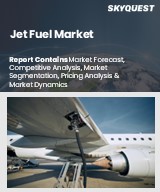
Report ID: SQMIG10C2049
SkyQuest Technology's Jet fuel market size, share and forecast Report is based on the analysis of market data and Industry trends impacting the global Jet Fuel Market and the revenue of top companies operating in it. Market Size Data and Statistics are based on the comprehensive research by our Team of Analysts and Industry experts.
Global Jet Fuel Market size was valued at USD 274.58 billion in 2023 and is poised to grow from USD 286.94 billion in 2024 to USD 408.05 billion by 2032, growing at a CAGR of 4.5% during the forecast period (2025-2032).
The jet fuel market is experiencing substantial growth due to the increasing demand for air travel worldwide. As global economies recover, air traffic has surged, driven by factors such as the expansion of low-cost carriers and rising disposable incomes in emerging markets, particularly in Asia Pacific. This growing air travel demand directly impacts the need for jet fuel, as airlines require more fuel to operate their fleets.
Additionally, the market is being shaped by the industry's shift towards more sustainable fuel options, driven by environmental regulations and the desire for reduced carbon footprints. These trends are expected to continue driving the jet fuel market's expansion in the coming years.
How is AI Enhancing Supply Chain Management in Jet Fuel Distribution?
AI is playing a significant role in optimizing the production process of jet fuel. By leveraging machine learning algorithms and predictive analytics, refineries can enhance the efficiency of refining processes. AI helps in monitoring the quality of crude oil, predicting the best refining conditions, and reducing waste.
For instance, AI algorithms are used to optimize refinery operations by analyzing vast amounts of data from various sensors, ensuring higher yield and lower energy consumption. This can lower production costs and enhance the overall profitability of jet fuel production.
AI is increasingly being used to streamline the distribution of jet fuel by improving supply chain management. AI-powered systems help optimize inventory levels, forecast demand, and predict supply chain disruptions. In the jet fuel market, AI helps ensure that fuel is delivered to airports in the right quantities and at the right time. By utilizing AI for predictive analytics, airlines and fuel suppliers can minimize downtime, reduce excess inventory, and improve the efficiency of fuel delivery. This leads to smoother operations and better management of fuel costs across the entire supply chain.
REQUEST FOR SAMPLE
Global Jet Fuel Market size was valued at USD 284.58 Billion in 2023 and is poised to grow from USD 297.87 Billion in 2024 to USD 429.15 Billion by 2032, growing at a CAGR of 4.67% in the forecast period (2025-2032).
The competitive landscape of the global jet fuel industry is currently undergoing a significant transformation, primarily driven by the urgent need for decarbonization and the emergence of sustainable aviation fuels (SAF). Traditional oil and gas giants, such as ExxonMobil, Chevron, BP, Shell, and TotalEnergies, are major players with established infrastructure for production, distribution, and supply of conventional jet fuel. 'LanzaJet', 'International Airlines Group (IAG)', 'Honeywell ', 'ExxonMobil', 'Chevron', 'BP p.l.c.', 'Shell', 'TotalEnergies', 'Neste', 'World Energy, LLC', 'Gevo, Inc.', 'Aemetis, Inc.', 'Fulcrum BioEnergy', 'SkyNRG'
The growing global demand for air travel is a key driver for the jet fuel market. This demand has been further accelerated by the expansion of low-cost carriers and increasing disposable incomes in emerging markets, particularly in Asia Pacific. As the volume of flights increases, airlines require more jet fuel to meet the operational needs of their fleets, thereby driving the growth of the jet fuel market.
Growth in Sustainable Aviation Fuel (SAF): Sustainable aviation fuel (SAF) is emerging as one of the most significant global jet fuel market trend in the jet fuel market. SAF is produced from renewable resources like biofuels, waste oils, or even algae, offering a more sustainable alternative to conventional jet fuel. The adoption of SAF is gaining momentum as airlines and airports worldwide commit to carbon-neutral targets. SAF not only helps reduce the aviation industry's environmental impact but also aligns with regulatory requirements regarding emissions. Major airlines and energy companies are investing heavily in SAF production and partnerships to meet sustainability goals.
What are the Key Factors Driving the Jet Fuel Market in North America?
Want to customize this report? This report can be personalized according to your needs. Our analysts and industry experts will work directly with you to understand your requirements and provide you with customized data in a short amount of time. We offer $1000 worth of FREE customization at the time of purchase.
Feedback From Our Clients

Report ID: SQMIG10C2049
sales@skyquestt.com
USA +1 351-333-4748